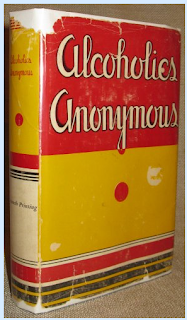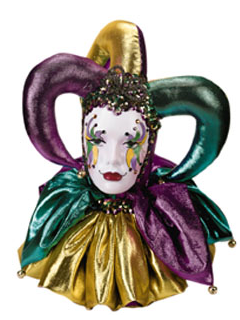We often hear that, "The First Step is the only step you can do 100 percent." Well, yes and no. In his essay on Step 6 in the Twelve Steps and Twelve Traditions, Bill writes that the only step we can practice one hundred percent is Step One, and we do that by "not taking that first drink." Note, however, that here he makes no reference to the second part of the First Step, the admission that our lives have become unmanageable. The continuous realization of this unmanageability is an exercise in humility that few, if any, can manifest one hundred percent of the time.
One of the first lessons I grasped coming into the AA fellowship was that, "Being honest means you don't have to remember your stories." I was rife with stories and explanations of just who I was, what I had done, and what I could do, all in a vain attempt to fit myself comfortably in with my fellow beings. I quickly learned that I was accepted and welcomed for who I am, and that the stories I spun were unnecessary fo fit in with my sponsor and my newfound friends. I quickly integrated that honesty into the other relationships in my life, those at work, at home and in the community.
It was quite a few years, however, before I realized for myself that, "Humility means I do not have to remember who to be." The analogy of the alcoholic addict as an "actor" is, at least for me, a metaphor that strikes home. I used to present one persona to my friends, another persona to my family, a third persona to my wife and kids, a fourth persona at work etc., always pretending to be some version of the "me" that would fit in with others, and so soothe what Bill identified as those horrible feelings of "anxious apartness." Replacing anxiety with frivolity and a sense of well being, and replacing that sense of apartness with a sense of unity and comeradery with my fellow partiers was, of course, one of the principal drivers of my addiction. The problem of the alcoholic truly centers in the mind.
In the first section of Alcoholics Anonymous (AA's primary text, a.k.a., the "Big Book"), there is discussion of three illusions and/or delusions (things which we really think are or may be true, but which aren't; i.e., lies which we tell ourselves and which we then believe) . Dispelling these delusions is essential for long-term recovery and and contentment in life. The first two of these illusions/delusions are found in the first two paragraphs of the chapter, "More About Alcoholism," while the last delusion is found at the end of the "alcoholic as actor" discussion in the "How It Works" chapter.
Bill Wilson was an old-school writer. When asked what the difference was between a "defect of character" and a "shortcoming," he said there was no difference at all, he just didn't like to end two sentences in a row with the same word. Another "old-school" composition guideline you will notice he sticks too in his writing is the basic rule of, "one thought, one paragraph."
Thus, when he writes in the first paragraph of "More About Alcoholism" that the suffer must get over "the great illusion" of every alcoholic addict, that one day he will again "be able to control and enjoy his drinking," that is exactly one idea. There is no other path to sobriety but through abstinence, for when one crosses the line into alcoholic addiction, there is no going back to the "controlled" drinking of prior years. Getting rid of this "great illusion" requires an honest admission (and acceptance) of a truth: You might think you can 'control' your drinking, but you surely won't enjoy it. Or, you might 'enjoy' some more 'uncontrollable' drinking, but not for long. Either way, such attempts lead almost invariably to one of three places - jails, mental institutions or death. This is, in essence, the sum of the first illusion/delusion Bill sets out in the Big Book. It requires inner honesty of the fact you are an alcoholic addict to shatter this first illusion
 |
| Bill Wilson, A.A. Co-Founder |
More so than other so-called "normal" individuals, the overly obsessive nature of the alcoholic's ordinary 'stream of thought,' self-conscious narrative, or 'ego' - what Bill describes elsewhere as a "painful inner dialogue" - causes profound emotional disturbance. Such mental and emotional unrest, left unchecked, can compel the alcoholic to act in any number of seemingly bizarre ways, the most bizarre (yet common) reaction being to pick up a drink of the alcohol that is slowly killing him or her.
"Other people" relieve the emotional turmoil caused by their ordinary egoic thinking in an endless variety of ways - overworking, vegetating in front of a television, losing themselves in exercise or their hobbies, perhaps in passing fits of anger and aggressive behaviour, perhaps in coaching kids' sports, or a perhaps in a mania for shopping - alcoholic addicts relieve such emotional excess by drinking and using drugs to shut down their thinking and the emotional turmoil it causes.
Ordinary non-alcoholics, thus, have a variety of means, more or less healthy, to cope with their inability to manage their lives and the circumstances life presents while getting along in society. The alcoholic addict, on the other hand, deprived of his or her chemical sustenance, has no clear means of gaining comfort and fitting in with others. "Self-centered to the extreme," the alcoholic tries any number of behaviours, and adopts any number of personae, as a means of getting a seemingly existential pressure off him or herself; a pressure that is brought on by trying to manage the world and its inhabitants so that life brings him peace, comfort and what he or she thinks they need.
But life itself is inherently "unmanageable." Billions of years of evolution have brought humanity to the point where we think we should be able to manage life, and yet life still remains inherently unmanageable despite all our efforts. While non-alcoholic, "normal" people can (perhaps) afford to bang away at life, trying to bend it to their will with results that are more or less painful when such efforts inevitably fail, the alcoholic addict cannot. Alcoholic addicts will almost invariably return to chemical addiction if they continue to bluff their way through life, adopting various tactics and roles in a vain effort to manage their world and, by extension, all of the people and things which constitute the world. "The delusion that we are like other people, or one day will be, must be smashed." Humility, and an admission that (a) that we are alcoholics and (b) that our lives are unmanageable - both before and after our active addiction, and despite all of our great exertions to do so - are thus essential to overcoming the first two of these delusionary barriers to sobriety.
Unlike "other people," an honest and humble admission and acceptance of personal powerlessness to manage life itself is necessary for continuous and contented sobriety. In that way, we will always differ from the ordinary human sufferer; therefore, we must seek a power greater than our ordinary "selves" - greater than our individual egoic thinking - to rely on in order to assist us through an unpredictable and unmanageable world. This is a humbling process that cannot be avoided, and resistance to it is very painful and potentially lethal.
This brings us to the third and last delusion that the alcoholic must give up: the delusion that he can (or needs to) manage life. Bill describes the alcoholic addict to "an actor" tearing through life, forever rearranging the lighting and forever rewriting the script, vacillating from kindness and pleasantrty to anger and brutality in order to get his way - certain that the results will be good for everone, even himself. Bill's actor metaphor quite clearly captures the alcoholic addict's greatest delusion: that he and he alone - through sheer determination, relentlessness and willpower - can sustain and keep his life both manageable and successfully integrated with the world around him.
"Is our actor," Bill writes, "not a victim of the delusion that he can wrest satisfaction and happiness out of this life if he only manages well?" One of the first lessons I was taught in AA, is that, "If you are honest you don't have to remember the story." A lesson it took me a long time to learn, typically taking a tough slog through suffering to do so, is that, "If you are humble, you don't have to remember who you are supposed to be, or what needs to be done next."
Life unfolds at its own pace and it is always on time. There is no emergency that requires me to try and wrest control of life from the forces, energy and cultural ideas that have evolved over billions of years. Humility keeps me from grabbing life's steering wheel, desperate that life's course run this way or that, and so that it will be good for everyone - even me. I have learned that it is far better to be myself and accept life on life's terms, than it is to try and be someone or thing I am not in a useless and painful attempt to bend life to my terms. Humility, as well as honesty, is required to do so.


No comments:
Post a Comment